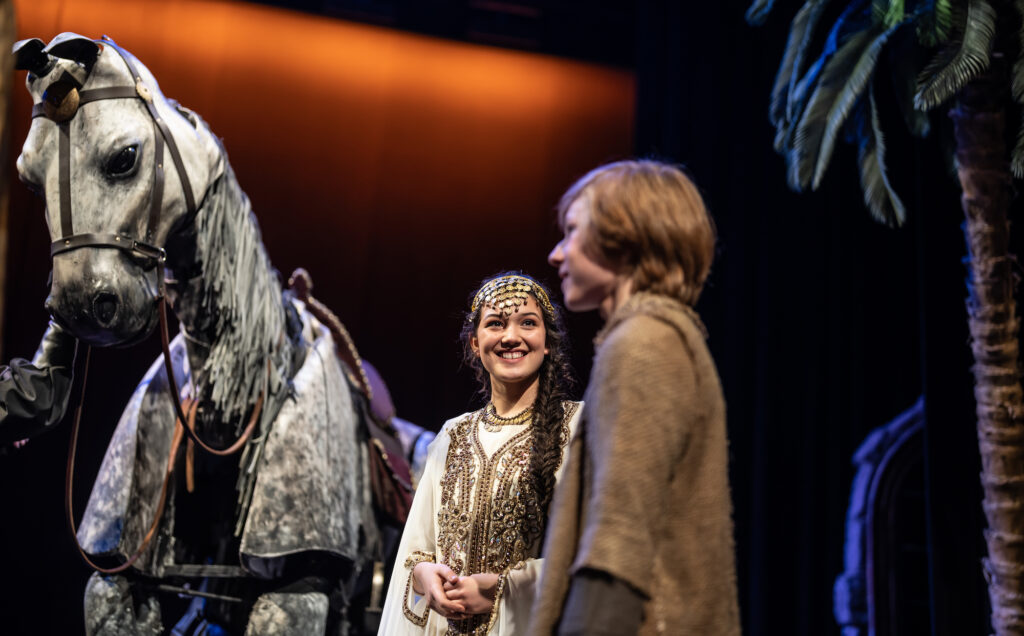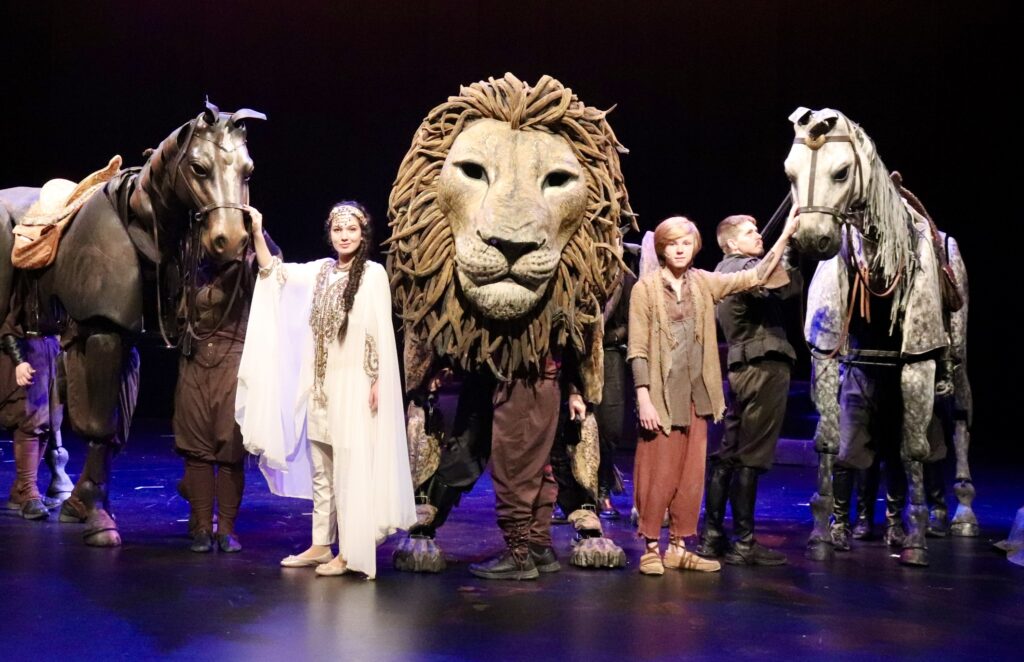‘Chronicles Of Narnia’ Epic Takes The Stage This Week In Washington, D.C.
Following 16 years of staging well-received original and adapted plays, a South Carolina-based theater troupe is bringing C.S. Lewis’ fantasy epic “The Horse and His Boy” to the World Stage Theater located at the Museum of the Bible in Washington, D.C. The show premieres on Friday, the first of 41 performances set to run through March 3.
A fan-favorite and largely standalone story in “The Chronicles of Narnia,” some readers may be skeptical that this sweeping hero’s journey — with two horses and the Great Lion, Aslan, in significant roles — can work as a live performance. But the 48-member Logos Theatre troupe isn’t doing it halfway, having created massive puppets for these unique animal roles, each requiring three performers.
“It brings a lot of excitement to the stage, seeing live puppeteers bring these horses to life,” said director Nicole Stratton in an interview. With complex puppets constructed with fiberglass, aluminum, various other materials, and the use of 3D printing technology, the play builds on innovations introduced in recent years on Broadway shows, including “War Horse” and “The Lion King.”
While local critics have called Logos Theatre productions “engrossing” and “incredible,” the review that matters most to the team is closer to the source.
Douglas Gresham, age 77, stepson of C.S. Lewis and a key figure in the Lewis estate, worked with Stratton when the troupe first planned in 2019 to stage “The Horse and His Boy.” It’s a novel that Lewis dedicated to Gresham and his brother. (“No pressure, right?” said Stratton.)
Gresham traveled to their high-tech theater in Taylors, South Carolina, near Greenville, to watch the show. “I never lost attention for a split second,” said Gresham in a post-show interview online. “There are so many little bits and pieces that I loved [that] I was concentrating on the whole thing.”
But how will it play in Washington? While known for its nearly 70 venues and troupes giving live performances in any given season, the theater scene has struggled to rebound following Covid-related restrictions that were recently lifted.
A museum representative sounds hopeful. “Nearly three years after the pandemic first shuttered performance venues across D.C., Museum of the Bible is thrilled to be bringing live theater back,” said Charlotte Clay, director of marketing and communications, in a statement.
Fantasy Drama Speaks to Current Issues
In the story, an orphan boy, Shasta, and a war horse, Bree, endeavor to escape enslavement and travel by night “to Narnia and the north.” It’s the only one of Lewis’ Narnia stories to begin without modern-day characters entering the fabled land.
Soon, another talking Narnian horse, Hwin, and teenage princess, Aravis — who is fleeing days prior to her arranged marriage to a man decades older — happen upon Shasta and Bree. The four become an unlikely caravan during the three-hour drama, with the two children’s conflict evolving as the story progresses.
Liliana Groth, age 15, who plays Aravis, said she relates to her character. “Well, I have younger brothers, so I am able to be commanding and a little haughty,” she told me with a smile. “At the beginning, Aravis puts up a lot of these fronts because she’s been raised as a spoiled princess for all of her life. I especially love acting with Brinton because he gives that sass right back.”

Brinton Stratton, age 13, grew up around Logos Theatre and its affiliated Academy of Arts, where his mother, Nicole, is the artistic director. He began playing Shasta this past summer after another actor aged out of the role. “This part has a lot of lines and cues, so I was nervous,” said Brinton. “But I started memorizing it and now playing Shasta is second nature.”
Willing to address potential nepotism, Nicole Stratton said her son auditioned just as his peers did. She added that their culture of mutual support in the Academy results in few “envious attitudes” among students since they emphasize how there are “no small parts.”
Though it’s a fantasy quest with some humor, slavery and child brides aren’t the only mature topics it raises. “Both Shasta and Aravis are so despondent about their lives that they’re willing to end it to get out of that,” said Stratton. “This story shows every life has a purpose.”
Groth shares emotionally how the issue of suicide has touched her life. “I feel like in today’s world, many people, especially youth, come to that point where they feel it’s not worth it anymore,” she said. “In 2018, I lost my cousin to suicide. He was only 17 years old.”
With tears, she connects that perplexing loss to this fictional story. “I really wish he could have seen this play because I feel like he could have taken away that message of a greater purpose.
“Life is not hopeless, even when — like for these characters — you cannot see the bigger picture.”
Extraordinary Effort to Stage Epic Story
Similar to the museum itself, with interactive exhibits that “set a new standard,” according to The Washington Post’s critic, the scale and scope of this production are likely to surprise audiences.
Using state-of-the-art mechanics allowing for emotive capabilities, the hand-crafted, larger-than-life puppets rival the work of major stage shows playing on the Great White Way in New York City.

“Acting is the art of reacting, so it’s helpful to have live actors performing these animals,” said Groth. “Having ridden horses for years, sometimes I still put my hand on its rump to make sure it doesn’t kick me as I walk behind it. It really feels like a living, breathing horse next to me.”
In addition, cast members in the large ensemble hail from 10 states, with eight of the 48-member team recruited locally. Between rehearsals, some children are video-conferencing into their school classes.
“We’ve had to split forces,” said Stratton, noting another production being mounted back home. “Our cast is filled out with young people whom we’ve worked with and proven throughout the years. This gives them a big opportunity.”
Each night for the next 40 days, the fruits of their labor will be seen as the curtain goes up at the 472-seat World Stage Theater, less than a mile away from the U.S. Capitol. Since opening, the Museum of the Bible has hosted several concerts but only one other major stage production — “Amazing Grace: The Musical” — which garnered largely positive reviews.
From the technical challenges of a traveling show to the logistics of housing dozens of people, it’s been a huge undertaking for Stratton and her team. While “The Horse and His Boy” exceeds high expectations of live theater, the director says it’s not Broadway aspirations that drive them.
“You couldn’t really pay me enough to do this amount of work just for theater,” says Stratton. “I’m doing this because it is a part of the attributes of God to communicate. In this exciting story, layers of meaning and beautiful allegory are woven in that speak to every person.”
“The Chronicles of Narnia: The Horse and His Boy” will be performed daily from Jan. 20 to March 3 at World Stage Theater in Washington, D.C. The show runs three hours with a 20-minute intermission.
Josh Shepherd covers culture, faith, and public policy for several media outlets including The Stream. His articles have appeared in Christianity Today, Religion & Politics, Faithfully Magazine, Religion News Service, and Providence Magazine. A graduate of the University of Colorado, he previously worked on staff at The Heritage Foundation and Focus on the Family. Josh and his wife live in the Washington, D.C. area with their two children.





Comments are closed.